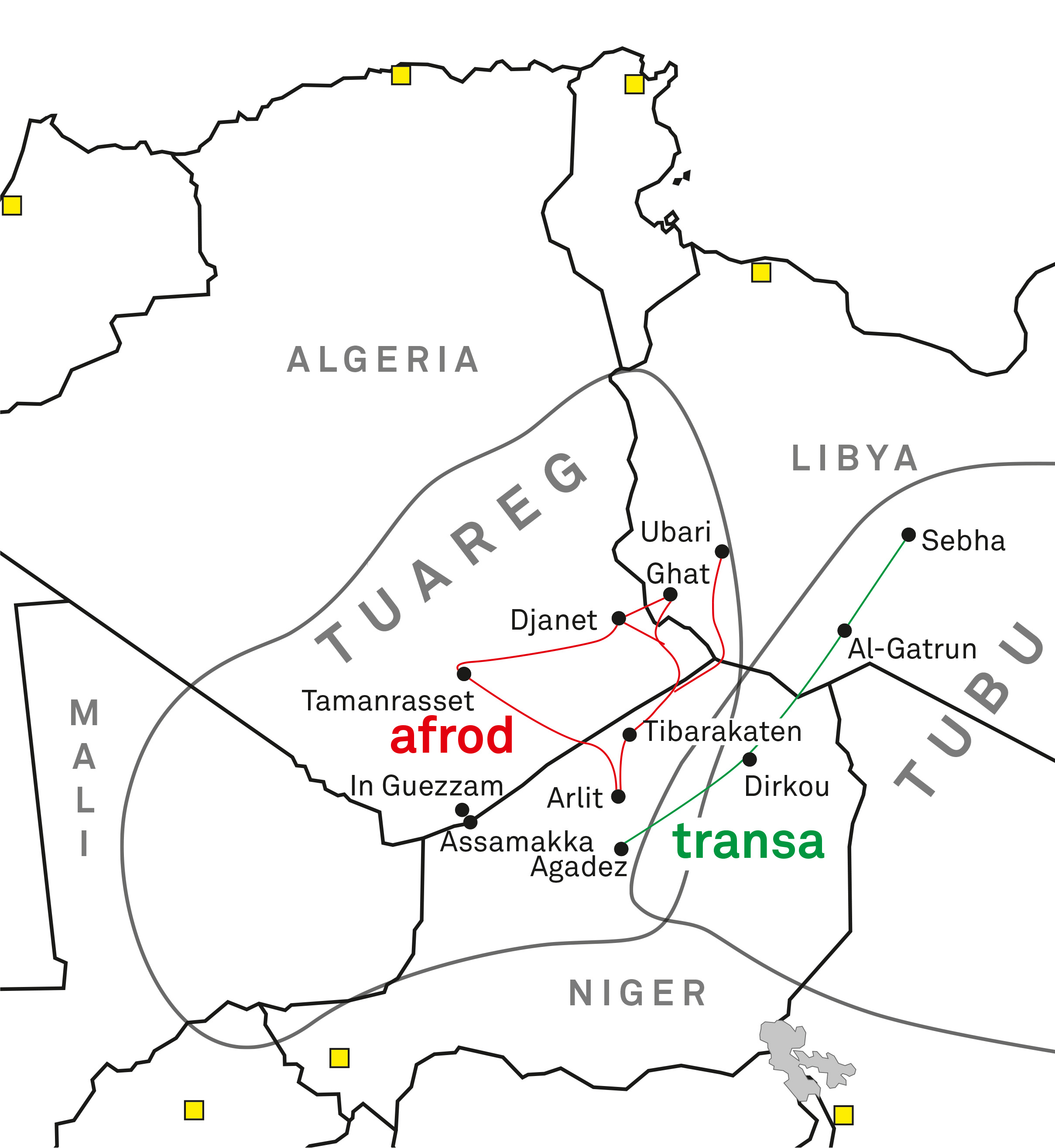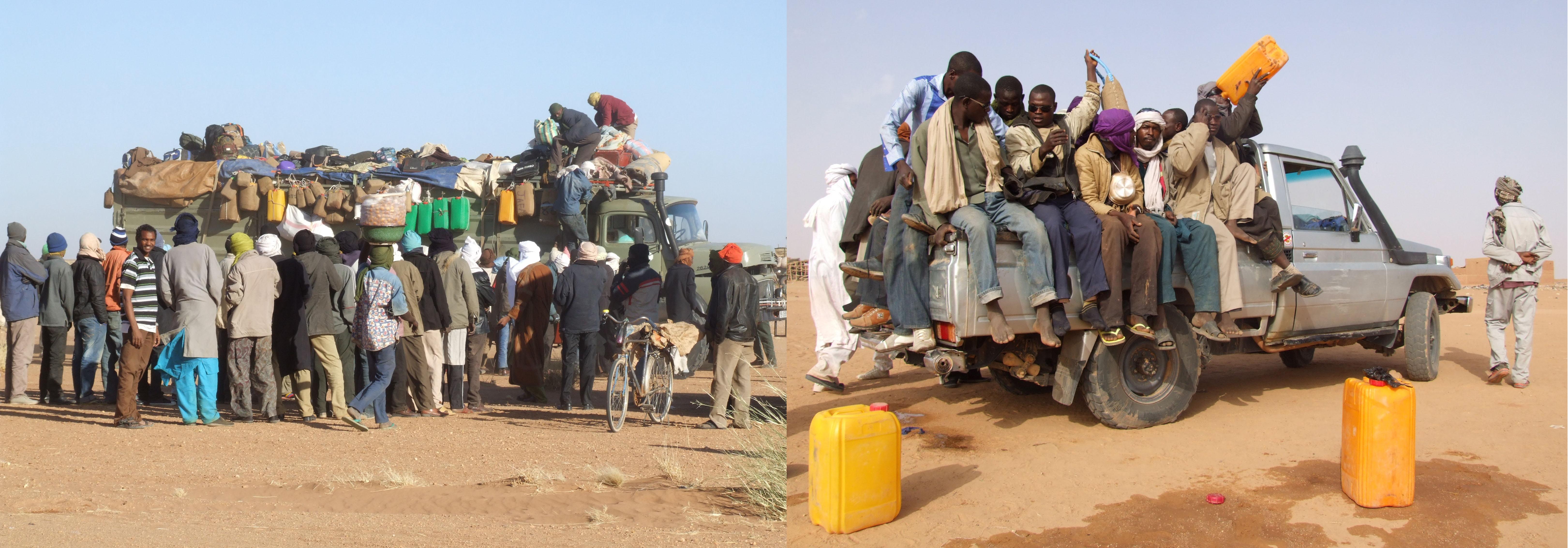Before Sub-Saharan migrants and refugees reach the Mediterranean, they have to pass through the Sahara. Crossing the ‘second face of the Mediterranean’1 is an exhausting and dangerous venture that requires specific equipment and logistical support. The Tuareg are among the main protagonists in this trade and have developed a transnational operational space in the Sahara, where the boundaries between legal and illegal are merged, and the distinction between trade, smuggling and migration is blurred. Their know-how of the desert, tribal and kin cross-border relations, and sophisticated use of multiple identities allow the Tuareg to engage in an economic niche: transportation through the Sahara.
Since decolonisation and the nation-building process in North and West Africa, the Tuareg have found themselves spread over five countries: Libya, Algeria, Niger, Mali and Burkina Faso. In order to stay in contact with kin, utilize labour possibilities in the Maghreb countries, and fulfil trading and smuggling strategies, the Tuareg have developed a Saharan transportation system. Beginning in the 1960s, first with camels, then with Land Rovers and, since the 1980s, with Toyotas, the Tuareg have been engaging in what they call afrod – derived from the French word ‘la fraude’ (fraud). As well as providing transport for Tuareg across the Sahara between Mali/Niger and Libya/Algeria, afrod is used to smuggle subsidized staple food (milk powder, macaroni, tomato paste, oil, sugar, etc.) and cheap fuel on the way back to Mali/Niger.
During the great droughts in the Sahel in the 1980s and the Tuareg rebellion in Niger and Mali in the 1990s, afrod became increasingly important as whole families fled military suppression to find refuge in Algeria and Libya. This triggered the development of a transportation structure that now serves African migrants on their way to Europe.
Two types of transport in Niger
There are two routes used in Niger with different means of transport and different protagonists: afrod and transa.

Afrod is the route from Agadez/Arlit (Niger), via Tamanrasset/Djanet (Algeria) to Ghat/Ubari (Libya) and is almost exclusively run by Tuareg with Toyota pickups. Between 28 and 32 passengers are transported in each vehicle, which take 3 days to cross the 1,000 kilometre route in a convoy of several cars.
Transa is the truck route from Agadez via Dirkou (Niger) to Gatrun/Sebha (Libya) and is the main route for Sub-Saharan migrants. Between 100 and 120 passengers are transported on each truck, passing through the Sahara in 1–2 weeks. It is a half-official route through military check points at which transit duty is paid, even though the passengers have no passports or valid visas. Transa is organized by Arabs, Hausa and Tebu. Very few Tuareg work in this system.
From March to December 2013, more than 40,000 migrants are estimated to have been transported by transa, as reported by the Italian NGO Reseau Exodus/Bambini nel Deserto – but the real figure may be more than double, as the data derives from governmental controls on one check point and many drivers do not register. According to the Altai Consulting report in 2014, 45,298 people officially arrived in Europe via the ‘Central Mediterranean’ route in 2013 (increasing to 170,664 people in 2014), which includes the Niger-Libya connection.

Three skills and strategies explain why the Tuareg have been successful in operating border crossings and are likely to continue in the future:
- Sahara know-how: To cross the Sahara without maps or GPS requires an excellent orientation relying on the sun, stars, land formations, and surface characteristics (such as colour and sand structure). An outstanding knowledge of driving is essential, as well as an ability to read the traces (tracking). As many Tuareg are born in the Sahara and spend their childhood herding goats, they have a basic understanding of how to live and survive in the Sahara. Drivers starts as apprentices on several trips, during which they are responsible for repairing the vehicle and assisting the driver.
- Trans-border relations: The Tuareg can rely on family and tribal networks in all countries covered by these routes. They receive support with information about military controls, shelter and other help. Due to their fragmentation across several states with different lingua franca, competing economies and diverse ideologies, the Tuareg have become cosmopolitan: Most of them have multiple places of residence, are used to handling different social, political and bureaucratic systems, and are able to communicate in several languages (French, Arabic, Hausa) besides their mother tongue. They live a truly transnational lifestyle, which is necessary for success in the trans-border business.
- The use of multiple identities: Many Tuareg possess multiple citizenship. All North and West African countries have started to register their nomadic populations, and the Tuareg use this system to obtain papers from all of the countries that they visit regularly, although often with different names and dates of birth. This tactic is also used for their vehicles; many drivers possess licence plates from Niger or Mali and Algeria.
Current challenges
Since the outbreak of the Libyan war, migration transport has changed. The Tebu’s financial and territorial control in Eastern Libya has increased; they now control not only the Libyan-Nigerien border, but have also installed a quick connection between Agadez and Sebha using Toyota Hilux on the route of the transa. The Tebu have challenged the monopoly of the Tuareg, which has resulted in violent incidents between them.2
Although the conditions for the Tuareg’s transnational border business have become more difficult, afrod will continue, as the inner-Saharan traffic is not administered by states, nor is the food supply sufficiently organized by the Nigerien (or Malian) government. As long as there are no legal possibilities for immigrating to the EU, this clandestine business will go on as before. The EUCAP Sahel Niger (European Union Mission in Niger) reception camp planned for migrants in Agadez will most likely try to stop the transa system to suppress migration to Europe.3 But, for the Tuareg, this would imply an increasing interest in the afrod route and need for their logistic support.
A Tuareg driver who has been working between Arlit and Djanet for years commented: ‘Afrod has not changed. The people and the circumstances have changed. I started with afrod in 1986, now I am retired [laughing]. First we worked with camels, then with Land Rover, and later with Toyota Station and Toyota Quarante-cinq. Today we use ‘deux-cent’, ‘injection’, and ‘jelko’. Recently, the route to Djanet is left over, tomorrow it will reopen again. Afrod will never end. Afrod is our work!’ (1 January 2012, Arlit).
Footnotes
- Braudel, F. (1972) The Mediterranean and the Mediterranean World in the Age of Philipp II. London: Collins [1966]
- See: Stevis, M. (2015) ‘Rich smuggling trade fuels daily migration across Mediterranean’, 20 April 2015, The Wall Street Journal. http://www.wsj.com/articles/rich-smuggling-trade-fuels-deadly-migration-across-mediterranean-1429576356; International State Crime Initiative (2015) Tuareg accuse France of promoting Libya’s latest post-Nato war. http://statecrime.org/state-crime-research/tuareg-accuse-france-promoting-libyas-latest-post-nato-war/
- http://www.consilium.europa.eu/en/press/press-releases/2015/05/13-eucap-sahel-niger/;
http://www.newslettereuropean.eu/eu-commits-boost-border-capacities-african-countries/
